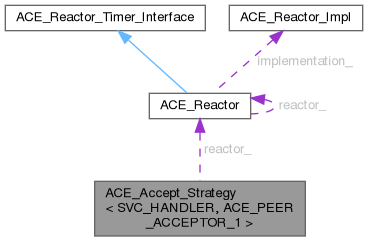Defines the interface for specifying a passive connection acceptance strategy for a SVC_HANDLER. More...
#include <Strategies_T.h>

Public Types | |
| typedef ACE_PEER_ACCEPTOR_ADDR | addr_type |
| typedef ACE_PEER_ACCEPTOR | acceptor_type |
| typedef SVC_HANDLER | handler_type |
| typedef SVC_HANDLER::stream_type | stream_type |
Public Member Functions | |
| ACE_Accept_Strategy (ACE_Reactor *reactor=ACE_Reactor::instance()) | |
| Default constructor. | |
| ACE_Accept_Strategy (const ACE_PEER_ACCEPTOR_ADDR &local_addr, bool restart=false, ACE_Reactor *reactor=ACE_Reactor::instance()) | |
Initialize the peer_acceptor_ with local_addr. | |
| virtual int | open (const ACE_PEER_ACCEPTOR_ADDR &local_addr, bool reuse_addr=false) |
| virtual ACE_HANDLE | get_handle () const |
| Return the underlying ACE_HANDLE of the <peer_acceptor_>. | |
| virtual ACE_PEER_ACCEPTOR & | acceptor () const |
| Return a reference to the <peer_acceptor_>. | |
| virtual | ~ACE_Accept_Strategy () |
| virtual int | accept_svc_handler (SVC_HANDLER *) |
| void | dump () const |
| Dump the state of an object. | |
Public Attributes | |
| ACE_ALLOC_HOOK_DECLARE | |
| Declare the dynamic allocation hooks. | |
Protected Attributes | |
| ACE_PEER_ACCEPTOR | peer_acceptor_ |
| Factory that establishes connections passively. | |
| ACE_Reactor * | reactor_ |
| Pointer to the reactor used by the Acceptor. | |
| bool | reuse_addr_ |
| Needed to reopen the socket if <accept> fails. | |
| ACE_PEER_ACCEPTOR_ADDR | peer_acceptor_addr_ |
| Needed to reopen the socket if <accept> fails. | |
Detailed Description
class ACE_Accept_Strategy< SVC_HANDLER, ACE_PEER_ACCEPTOR_1 >
Defines the interface for specifying a passive connection acceptance strategy for a SVC_HANDLER.
This class provides a strategy that manages passive connection acceptance of a client.
Member Typedef Documentation
◆ acceptor_type
| typedef ACE_PEER_ACCEPTOR ACE_Accept_Strategy< SVC_HANDLER, ACE_PEER_ACCEPTOR_1 >::acceptor_type |
◆ addr_type
◆ handler_type
| typedef SVC_HANDLER ACE_Accept_Strategy< SVC_HANDLER, ACE_PEER_ACCEPTOR_1 >::handler_type |
◆ stream_type
| typedef SVC_HANDLER::stream_type ACE_Accept_Strategy< SVC_HANDLER, ACE_PEER_ACCEPTOR_1 >::stream_type |
Constructor & Destructor Documentation
◆ ACE_Accept_Strategy() [1/2]
|
inline |
Default constructor.
◆ ACE_Accept_Strategy() [2/2]
| ACE_Accept_Strategy< SVC_HANDLER, ACE_PEER_ACCEPTOR_1 >::ACE_Accept_Strategy | ( | const ACE_PEER_ACCEPTOR_ADDR & | local_addr, |
| bool | restart = false, | ||
| ACE_Reactor * | reactor = ACE_Reactor::instance () ) |
Initialize the peer_acceptor_ with local_addr.
◆ ~ACE_Accept_Strategy()
|
virtual |
Member Function Documentation
◆ accept_svc_handler()
|
virtual |
The default behavior delegates to the <accept> method of the PEER_ACCEPTOR.
◆ acceptor()
|
virtual |
Return a reference to the <peer_acceptor_>.
◆ dump()
| void ACE_Accept_Strategy< SVC_HANDLER, ACE_PEER_ACCEPTOR_1 >::dump | ( | ) | const |
Dump the state of an object.
◆ get_handle()
|
virtual |
Return the underlying ACE_HANDLE of the <peer_acceptor_>.
◆ open()
|
virtual |
Initialize the <peer_acceptor_> with local_addr, indicating whether to reuse_addr if it's already in use.
Member Data Documentation
◆ ACE_ALLOC_HOOK_DECLARE
| ACE_Accept_Strategy< SVC_HANDLER, ACE_PEER_ACCEPTOR_1 >::ACE_ALLOC_HOOK_DECLARE |
Declare the dynamic allocation hooks.
◆ peer_acceptor_
|
protected |
Factory that establishes connections passively.
◆ peer_acceptor_addr_
|
protected |
Needed to reopen the socket if <accept> fails.
◆ reactor_
|
protected |
Pointer to the reactor used by the Acceptor.
◆ reuse_addr_
|
protected |
Needed to reopen the socket if <accept> fails.
The documentation for this class was generated from the following files: